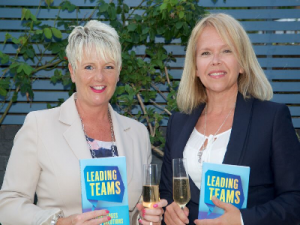 Ever heard the expression ‘knowledge is power’? Well, knowledge is only power if you give it away. Let’s look at why.
Ever heard the expression ‘knowledge is power’? Well, knowledge is only power if you give it away. Let’s look at why.
There are many reasons why employees don’t share knowledge or experience with each other, ranging from thinking in silos to a fear of being ridiculed.
Duplication of workload is a common impact when team members don’t share. When information, knowledge and experience are not shared it limits the intellectual capital of the team. The team will simply not perform at its optimal capacity.
Learning is negatively impacted too. When not sharing, you are taking away the other persons opportunity for learning and growth. The team’s growth is also affected.
As we move towards the year 2020, everyone expects and needs more openness and transparency, both within organisations and in the external world around us. It starts with us right here, right now, sharing more relevant information.
Here are 6 ways to encourage employees to share relevant information with each other.
It starts with you!
People often think knowledge is power and hold on to it rather than give it away. As a leader or communicator, if you want other people to share information, you need to be the one that kicks it off and show you’re not afraid to share, you’re not afraid to give something away. You can’t say ‘You all need to talk to each other’ unless you’re prepared to go first. By doing that you’re not saying ‘Do what I say’, you’re saying ‘Do what I do’. So be a role model for sharing.
Make people aware of the effect
Feedback is essential. Use it to encourage people, so they know that sharing was the right thing to do. Tell everyone ‘by sharing that information, this is what you get’. But also, point out when sharing might have helped – and didn’t happen – and do it in real time if possible. Everything is about learning. Create a culture of ‘We’re in this to learn’. People want more openness and transparency about their impact.
Create and run sharing ‘PODS’ (Power of Dynamic Sharing™)
Get people together and say ‘We’re going to share all we know on a specific subject’. Increasingly, the speed of change means people don’t have all the information they need. In fact, it’s impossible to have all the information. Organisations that want to be a step ahead get people together to share information on a specific subject. Make the group as diverse as possible to get a wide range of views. And make sure you have a clear expected outcome. Why are we sharing this? People must understand there’s a relevant and important purpose. Someone needs to facilitate to make sure there’s fair sharing and everyone gets heard. Be prepared for – and invite – conflicting views, then manage the process carefully and ensure that key points are drawn out and captured. There must be a conclusion on how to use the shared information in the future, so the next step is to communicate the outcome and next steps.
Link to the big picture
This is the real crux of sharing information – if you understand the context, if you understand why and how it links to what you are doing, the more likely you are to get involved and share yourself. It doesn’t matter if you’re in the NHS or banking, people need to understand they depend on other people, and people depend on them. That’s how any organisation works – it’s much bigger than the individual person.
Celebrate successes
By celebrating success of sharing you’re highlighting how crucial the sharing has been to success. Then dissect it. Why did it work well? If it worked well, find out why it worked and do that again, adapting it to new situations too. The pace people work at now means we rarely take the time to stop and celebrate something done well because we’re on to the next job. But it’s worth it, to stop and reflect. Make the case for generous and fearless sharing by noticing when it happens and recognizing people for doing it. Give team members the credit they deserve.
Dare to share
This is the champion. This is about the fear involved – fear of losing face or saying the wrong thing or sharing too much. Something very powerful happens when people see someone else dare to share. Behaviour breeds behaviour, disclosure breeds disclosure. Other people think ‘Oh, I’ll give it a go’ and suddenly you’re on the way to a more open organisation. No-one knows everything and the only way to improve is to share – otherwise you’re shooting yourself in the foot.
So go ahead, fearlessly share what you know with team members for the benefit of everyone.
Think about how you could share more today, ask yourself these questions:-
- How much sharing goes on in our team?
- How could I/we create more opportunities for formal and informal sharing?
- How am I a role model for information sharing?
- How much success are we creating through our sharing?
- How much more successful could we be if we shared more?
 About the authors
About the authors
Mandy Flint & Elisabet Vinberg Hearn, award-winning authors of ”The Team Formula”.
Their new book ”Leading Teams – 10 Challenges: 10 Solutions” is out now, published by Financial Times International.
Praise for ”Leading Teams: ”This book is a 21st-century guide on how to build a world-class team. I highly recommend it” Steve Siebold, Founder, Mental Toughness University, Florida USA.








